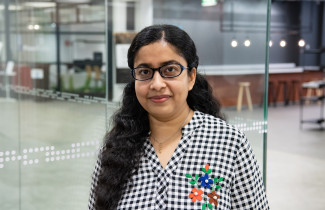”As much as I can recall, I have had a passion for public health. I want to have a voice in public health issues particularly in maternal and child health, which is still a developing area in Ghana,” says Theresa Opata Owusu-Serchire.
She graduated from the Master's Degree Programme in Public Health (MPH) at the University of Eastern Finland in June 2022 and is currently seeking a licence to practice medicine in Finland. “My long-term goal is to specialise in neonatology in a country such as Finland where this field is highly developed and later make a positive contribution in Ghana.”
Theresa is Ghanaian, but has also lived in Nigeria, where she obtained a Bachelor’s degree in Biochemistry. She then completed medical school in Ghana and worked as a medical doctor for a few years before applying to several master’s degree programmes in public health abroad. “I got accepted to all my schools of choice in the United States as well, but I could not obtain a study visa, so I opted to come to Finland. Besides, Finland offered a more affordable study option with excellent quality.”
“I think the basics were similar in all the programmes I applied to. However, what struck me about the programme at the University of Eastern Finland was the fact that it was research-driven, whereas many other universities had a more practical focus.”
The pandemic class started remotely
Theresa started in the MPH programme during the COVID-19 pandemic in 2020 and studied the first year remotely from Ghana. “The situation was new for the teachers as well, yet they managed to make a variety of distance learning channels available to us and offer us a good quality learning process.”
“Even during the second study year when I was in Finland, all courses were hybrid and some students remained in their home countries. For me, learning was easier when I could interact in person with teachers and fellow students. As there were students from various parts of the world, we could discuss our different health care systems and learn from each other.”
She says the strong research component in the programme gave her a confidence boost in scientific writing and literature review, among other things. “Students were also able to influence the content of the studies, for example the Maternal and Child Health course was introduced into the MPH curriculum at our request.”
The university campus in Kuopio is located right by a lake, with forests nearby. “I really appreciate the beautiful nature, clean environment and fresh air in the area. The campus also offers good facilities for self-study and group work and the library is available for use 24/7.”
“What was challenging for me at times were multiple simultaneous assignment deadlines. The Master’s thesis requires a semester’s worth of work, but our group still had many compulsory courses at the same time. However, our feedback was heard and the curriculum was changed so that the last semester is now dedicated to thesis work.”
Memorable moments from the two-year programme included a visit to Valamo Monastery. “We learned about the orthodox religion in Finland, but also how art and health can be connected.”
Tutor, ambassador and decision-maker
“When new students arrive in Kuopio, they are welcomed by a student tutor who helps them with practical issues during the first few weeks of settling into their new environment. I found this really commendable,” Theresa says.
During her studies in Kuopio, she herself acted both as a student tutor and as a student ambassador. “Student ambassadors show the student perspective of the university, giving their tips to applicants and students coming to Finland. We spoke at webinars and took over UEF’s social media channels, sharing a week of our studies, for example.”
In addition, Theresa ran and was elected to the Faculty Council of the Faculty of Health Sciences. She was in fact the first ever foreign student to do so.
“I wanted to learn about the decision-making process and to act as a voice for students. It was huge for me to sit down with teachers and professors who make decisions on behalf of the whole faculty.”
“Initially, language was a problem, as Finnish was the official language of communication at the university. However, to encourage diversity and inclusion, the use of English was recently introduced by the university as one of the meeting languages when necessary.”
Journey towards obtaining medical licence to practice in Finland
For medical doctors qualified outside the EU or EEA, acquiring a licence to practice medicine in Finland is a multi-step process supervised by the National Supervisory Authority for Welfare and Health (Valvira). The legalisation process includes having your degree recognised, demonstrating sufficient language skills, completing an internship and taking professional examinations.
Theresa is determined to complete the process.
“Attaining at least intermediate Finnish language skills is one of the requirements. To achieve this, I enrolled into the one-year intensive Finnish language course organized by the state-integration programme after graduating from the MPH programme. I have also been accepted into the preparatory training programme organized for foreign trained doctors starting in August, for the legalisation exams.”



